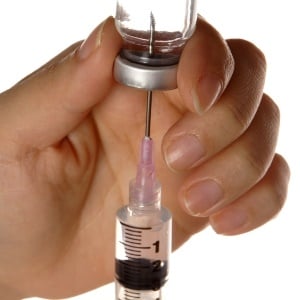
Most boys in the United States aren't receiving the cancer-preventing HPV vaccine alongside their other scheduled inoculations, largely because doctors fail to recommend it or adequately explain its benefits to parents, a new U.S. government study says.
Experts warned that without vaccination, these boys may face infection with the sexually transmitted human papilloma virus, a leading cause of multiple cancers.
Lack of understanding
Parents most often don't get the HPV vaccine for their boys because their health care provider didn't recommend it, according to researchers from the U.S. Centres for Disease Control and Prevention.
Read: Can men be tested for HPV?
That reason was given by 24 percent of parents whose 13- to 17-year-old sons had not received the shots, when asked as part of the CDC's annual survey on teen vaccinations.
The report was published online in the journal Paediatrics.
Parents also commonly cite a lack of understanding about the vaccine, said report co-author Shannon Stokley, associate director of science at the CDC's immunisation services division.
About 19 percent of parents felt the vaccine was not needed, 16 percent said they didn't know enough about it, and 7 percent had safety concerns, the report says.
Read: 7 facts about HPV
"We need to work with health care providers so they are making strong recommendations and communicating with their patients about the need for this vaccine," Stokley said.
All the parents' reported excuses point to their doctor as the weak link in the chain, said Debbie Saslow, director of breast and gynaecologic cancer for the American Cancer Society.
Cervical and anal cancers
Each year in the United States, an estimated 26,000 new cancers are attributable to HPV, including about 9,000 in men, researchers said in background material.
HPV causes nearly all cervical and anal cancers. The virus also causes about 70 percent of throat cancers, three-quarters of vaginal cancers and 63 percent of cancers of the penis, according the CDC.
Read: HPV infection same in men and women
Currently, about 79 million people are infected with HPV, and 14 million people will be infected each year.
The first HPV vaccine, licensed in 2006, initially was recommended only for girls, to protect them against cervical cancer. In 2011 the CDC began recommending HPV vaccination for boys as well.
CDC statistics show that nearly 42 percent of boys 13 to 17 had received at least one dose of the HPV vaccine in 2014, up from about one-third in 2013.
Only 21.6 percent of boys that age had received the full three-dose HPV vaccine series in 2014, Stokley said. That is up from less than 14 percent in 2013.
Read: Sexually active gay teenagers at risk of HPV
"We know it can go higher. We just need to work more," she said.
Researchers found that boys are more likely to have received the HPV vaccine if they are black or Hispanic, or in a single-mother household, or in a poorer family.
This could be an effect of federal programmes that provide scheduled vaccines for free to low-income families, Stokley said. It also could be caused by the Affordable Care Act, which requires that insurers cover the full cost of vaccinations.
'Blanching' at the prospect
Saslow said some doctors may be reluctant to recommend the HPV vaccine, for fear of offending parents.
Read: Can men get HPV?
"Providers have this perception the HPV vaccine is different than other vaccines," Saslow said.
"They think parents are more concerned about it, and they're worried parents aren't going to bring their kids back if they recommend it."
The vaccine is recommended for boys and girls 11 or 12 years old, and some parents blanch at the prospect of inoculating their child against a sexually transmitted virus at that age, Saslow said.
Unfortunately, taking the HPV vaccine out of the regular immunisation schedule drastically lowers the odds that a child will get the full series of shots, she said.
It also increases the odds that they will be exposed to HPV before getting the vaccination.
Read: HPV risk greater for single men
The American Cancer Society and other groups offer training for doctors to help them become more comfortable discussing the HPV vaccine, Saslow said.
Boys need to get the vaccine not only to prevent transmission to girls, but also to protect themselves from genital warts and cancers of the throat, penis and anus, she said.
"This vaccine prevents six or seven kinds of cancer, in boys and girls, men and women," Saslow said. "That's huge."
Read more:
Men need vaccine against anal warts, cancer




 Publications
Publications
 Partners
Partners















